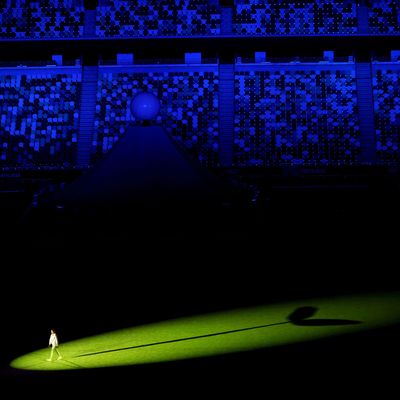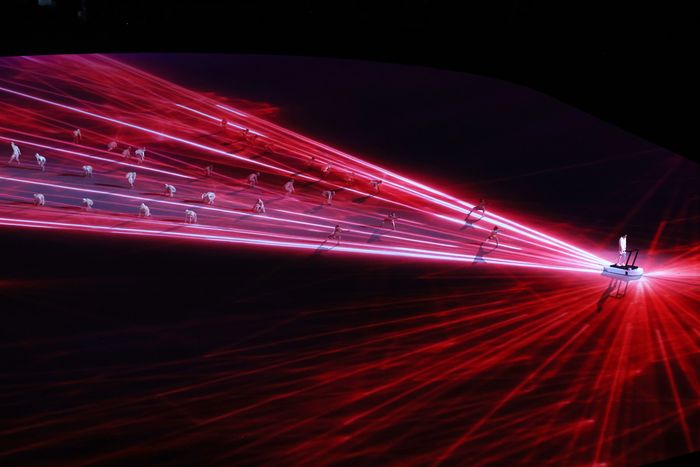
The Games of the XXXII Olympiad formally began by evoking a sense of isolation, specifically the isolation felt by athletes who have been training for their big moment during the extended COVID crisis that put these Games on hold for a full year and that many argue should have put them on hold for even longer.
The opening ceremony zeroed in first on Japanese boxer Arisa Tsubata, who had hoped to compete in these Olympics but was unable to do so after a qualifying match was canceled. She first appeared all alone in the center of Tokyo’s audience-free Olympic Stadium, while the image of a growing sapling was projected behind her, and later ran solo on a treadmill in the middle of the vast space. Another performer on an exercise cycle joined her, then another on a rowing machine, then still more running in place. Colored balls of light were projected into the space, perhaps to suggest that the digital realm kept athletes connected when an in-person Olympics could not. Personally, I looked at those balls of light and thought, Oh, nice. Pretty germs.
It was hard, if not impossible, to watch this determined effort to project normalcy amid the abnormal and forget about both the pandemic and the general cloud of pessimism that has settled over these summer Olympics in the days leading up to their start. Before the Parade of Nations, there has been a parade of bad Olympics news, including but not limited to: multiple athletes testing positive for COVID; several high-level Olympic officials stepping down or being dismissed for questionable behavior, including the director of the opening ceremonies, who was fired just yesterday because of a joke he once made about the Holocaust; a brown bear stalking some of the venues; a possible oyster infestation threatening the waterway where rowing and canoeing events are held; and Toyota pulling its Olympics-themed commercials from Japan’s airways in response to the backlash against the Games in the host country.
The atmosphere around an event that is normally met with excitement and a steady stream of feel-good stories has dampened a bit, to the point where it feels almost insensitive to say that you’re psyched to watch endless hours of swimming and diving. Mike Tirico, who co-hosted NBC’s live coverage of the opening ceremony with Today’s Savannah Guthrie, promised this Tokyo affair would be “more modest, more spare” than the lavish kickoffs of Summer Games past, which was an accurate, and polite, way to describe a production dominated by the sight of seats deliberately left unoccupied because of the pandemic surge in Japan. In practice, these are the Sadlympics, the Ill-lympics, the 2020 (or is it 2021?) Olympic “Because We Really Gotta Do This” Games, and the opening ceremony reflected that in ways that could be eerie and depressing but also oddly representative of the perseverance of the human spirit — or at least the perseverance of the human spirit when the IOC refuses to cancel the Olympics because, let’s face it, there’s too much money at stake.
If we’ve learned anything about the Olympics in recent weeks, it’s that they will abide by the status quo even when abiding by the status quo makes no sense. Hence everyone soldiering on with the opening ceremony and despite everything — Italics! Exclamation point! —sometimes even conjuring magic in the process. Japanese pop singer MISIA stood up and sang the Japanese national anthem while wearing an extravagant dress that looked like a massive, beautiful cherry blossom then was cheered at the end of her performance by what sounded like piped-in applause. The Japanese flag was raised while officials looked on soberly, all of their faces shrouded in masks. Tap dancers did an elaborate routine that involved building tables with lumber grown from seeds first planted by athletes who competed the last time Tokyo hosted the Olympics, back in 1964. Actors in white-and-blue body suits raced around to act out the pictograms that represent every single event in the Olympics. It was impressive and lovely, and yet there was heartbreak at the center of it all, knowing how much work had gone into a presentation that unfolded in front of empty seats and a global television audience that may be more indifferent to the Olympics than it ever has been. Only time and ratings will tell.
Uncharacteristic of previous opening ceremonies, this one paused early on for a moment of silence to honor the lives of those lost during the pandemic as well as those lost in previous Olympics; the tragic Munich Games in 1972, when members of the Israeli team were taken hostage and two were killed, was specifically mentioned. And characteristic of every opening ceremony in recent memory, the Parade of Nations went on as always, with coalitions of various sizes representing all corners of the globe, walking into the cavernous space to wave at the enthusiastic Japanese greeters and the sea of empty seats behind them. “At least with some of the dignitaries and journalists, there are some people to wave to,” Tirico remarked. Yes. At least. Who doesn’t dream of getting to the Olympics so they can wave at a few journalists?
Still, many of those athletes — nearly all masked, though a few seemingly didn’t get the memo about keeping both their mouths and vulnerable nostrils covered — did their best to make the most of it. The Argentineans, dressed in navy blazers, jumped up and down excitedly, while members of the Dominican Republican entered dancing. Pita Taufatofua of Tonga kept hot, oiled-up Olympic tradition alive by once again strolling shirtless during the Parade of Nipples, er, Nations.
Almost without exception, the two flag bearers for every country appeared to be fighting for control of their single flagpole. NBC, ever aware of their ad obligations, often opted to split the screen between the parade and commercials, which is why the three athletes from Suriname were ushered into these Olympic Games by the members of Girls5Eva, who appeared on the far right of the screen in a commercial for Peacock. (One of the most inspiring moments of the opening ceremony, truly, may have been a commercial for Ted Lasso that aired in the 7 a.m. hour.) Again, this was all normal: During every Olympics, companies take advantage of the opportunity to hawk their wares, and NBC, which has exclusively broadcast the summer games since 1988, welcomes the ad revenue. But this year, knowing what’s at stake for the athletes and the people of Japan — before the ceremony began, protesters of the Olympics were in the streets shouting “Go to hell, IOC. Go to hell, Olympics” — made the Olympic ad tie-ins seem a little off-putting. Japan may not have gotten a Toyota Olympics commercial, but we crass Americans sure did!
Speaking of Americans, around 9:30 a.m. Eastern time, Team USA walked into the opening ceremony dressed in Ralph Lauren nautical stripes and blazers, which evoked, depending on who you ask on Team Vulture, fancy border patrol (Dee Lockett), bully in a YA novel (Kathryn VanArendonk), or ’80s movie preppies starring in a production of Anything Goes (me). They chanted “USA! USA!” They snapped selfies and waved at NBC’s cameras. After all the delay and anticipation, they were finally here. Sure, maybe “here” felt like an ominous blank void, but it’s still the Olympics.
Before the torch was lit by tennis star Naomi Osaka, a cluster of drones created a ball of glowing light high in the Tokyo sky, an image that segued into a half-live, half-recorded performance of John Lennon’s “Imagine” arranged by Hans Zimmer and featuring singers from various continents. (John Legend repped the Americas, as he seemingly does in some form at every major event.) It was an earnest attempt to sync up with the theme of this opening ceremony, “United by Emotion,” and to hearken back to past Olympics where the song has been featured. It was also a silly moment that brought the pandemic full circle, all the way back to March of 2020, when the internet giggled at a group of celebrities for thinking that singing “Imagine” could bring us all together. It was déjà vu, a well-intentioned gesture, and an unintentional reminder of humanity’s hubris and naïveté in the face of a pandemic that still, still, won’t let up, in large part because of humanity’s hubris and naïveté. It was also a performance that made you wonder, What exactly are we doing here, and why? In that way, it was the perfect way to say, “Welcome to the 2021 Olympics, brought to you by the year 2020.”



